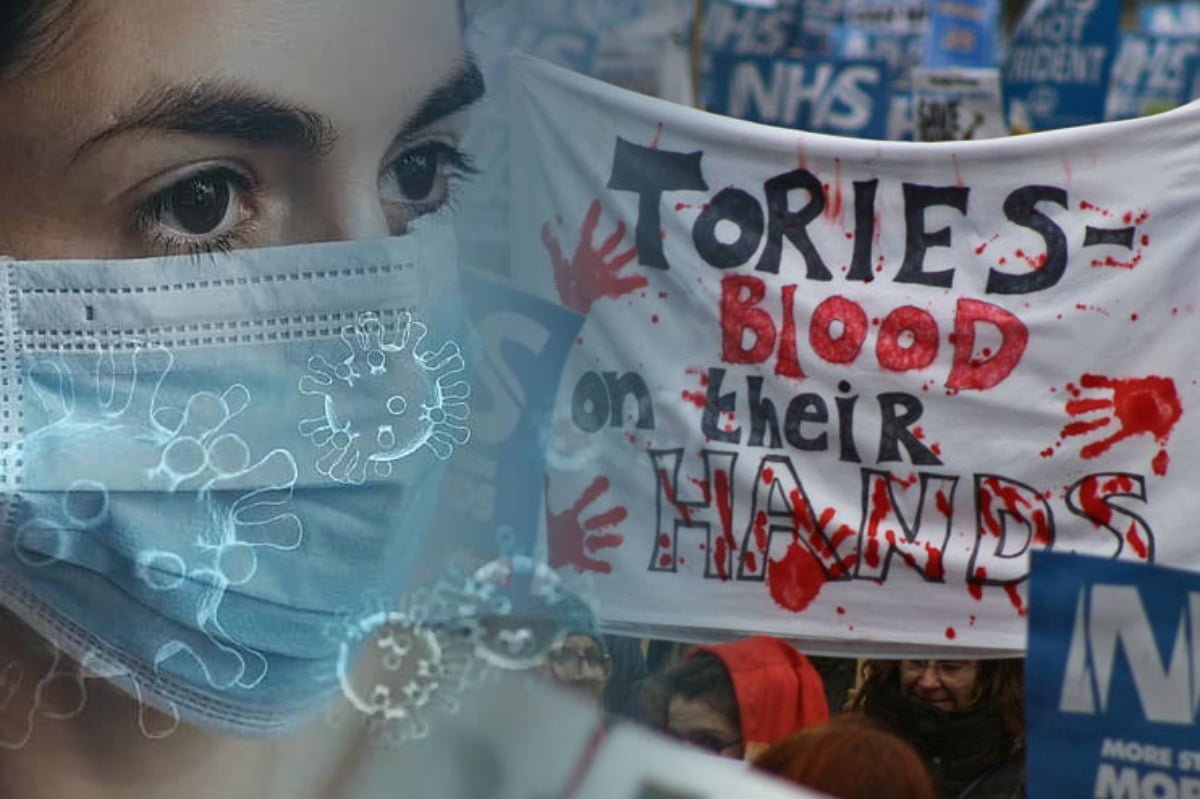Years of austerity, privatisation, and bureaucratic management have eroded the foundations of Britain’s public healthcare system. Patients, staff, and wider society have been left vulnerable in the face of the pandemic. Fight to save our NHS!
The devastating death toll caused by the coronavirus crisis calls for an honest analysis of what has gone wrong over with the running of society over the last few decades, and what needs to change to ensure that everyone in society is able to attain optimum health and wellbeing.
Before I became a full-time trade union organiser, I worked as a nurse on the frontlines of the NHS for 28 years. I saw at first hand the havoc wreaked by the continuous programme of pushing open market principles into the NHS and public services.
Cuts and privatisation
 The relentless cuts and privatisation of the NHS and public services destroyed the lives of my most vulnerable patients. Every restructure that occurred during my working life in the NHS invariably led to a drive towards cutting down the numbers, skills and experience of staff on the frontline.
The relentless cuts and privatisation of the NHS and public services destroyed the lives of my most vulnerable patients. Every restructure that occurred during my working life in the NHS invariably led to a drive towards cutting down the numbers, skills and experience of staff on the frontline.
The need for huge volumes of new data to be recorded increased. Workloads grew as demoralised staff – who wanted to care for patients, but were forced to spend endless hours on a PC – left the NHS for good.
When these staff left, their posts were downgraded, or the vacancy remained unfilled. Services were moved, named, and renamed; and criteria to access them changed. This left staff, patients and others utterly confused about who did what and how to access treatment and care.
I saw how the pay, terms and conditions of public sector workers was inextricably linked to keeping patients and the public safe, as the NHS became an increasingly unattractive employer. I observed how deliberate attempts were made by those with power to divide us and to silence our voices. Instead, we were all constantly told that there ‘was no money’ for delivering vital services.
Mental health
 Nowhere were the cuts more swingeing than in NHS mental health services, where I worked. The large mental health NHS trust my colleagues and I worked in constantly bombarded us with corporate models and methods. These sounded exciting, and seemed that they would support those of us who were working with patients to do our jobs better.
Nowhere were the cuts more swingeing than in NHS mental health services, where I worked. The large mental health NHS trust my colleagues and I worked in constantly bombarded us with corporate models and methods. These sounded exciting, and seemed that they would support those of us who were working with patients to do our jobs better.
We were pushed to discharge patients off our caseloads, so that they could integrate into society. And we were led to believe that supporting patients within the system over a longer term was somehow wrong and inhibited recovery. We were told that everyone could get back into work, and that there were no such words as ‘severe and enduring’ mental illness anymore.
Patients were to be called ‘service users’ or ‘customers’, and were to be awarded ‘personal budgets’ so that they could take control of their own care needs.
Time-limited sessions of cognitive behaviour therapy were offered to patients as the first and the main therapy of choice. How to obtain any longer-term therapy on the NHS became shrouded in mystery, with desperate patients being referred to independent therapists charging £50-60 for each session.
Medication was the one treatment that was always on offer, as other treatments became difficult to access. And care coordinators increasingly had to justify the reason behind every face-to-face contact with a patient.
The result of all of this was an explosion of record-keeping and documentation. This meant that the average nurse spent at least 50% of their time imputing data into a PC. And those patients who didn’t fit into the time-limited models of care being proposed were effectively left to relapse, readmitted into hospital time and time again. Even frequent readmissions were deemed to be ok by management, because this demonstrated activity, which was then funded.
Assessments were considered to be an end in themselves. And lengthy waits for any further therapy or treatment created a situation that was highly distressing and life threatening for patients.
Personal budgets were enthusiastically rolled out for every patient. These were used as a method to shutdown services like sheltered work and day centres, which were a lifeline for many. After all, who needs a day centre to socialise when you can go onto Facebook on the laptop you brought out of your personal budget!
Attacks on conditions
All of these developments coincided with attacks on the other necessities to sustain health recovery and optimum health. This includes the provision of social housing, and the provision of state benefits that vulnerable people could live on.
Many patients who were abandoned by ‘service redesign’ and ‘delivering sustainable services for the future’ ended up living in distress, poverty and squalor – left unsupported to deal with the increasing complexity of the housing or benefits system.
As job centres closed and benefit claimants were urged to go online, people found themselves unable to keep pace. Many were sanctioned as a result, meaning they had no money for weeks. People fell into arrears with rent and bills and suffered the consequences of this. This of course led to more of them relapsing, being sectioned, and locked up in hospital.
The rise of the gig economy and insecure work means that those people suffering from ill mental health who can go back to work often end up in the type of jobs that only offer low pay and bullying. This causes further psychiatric injury.
Only half the story was ever told. The success stories of mental health recovery were amplified, but the stories of those being failed – turned into cannon fodder for repeated admissions and trials of heavy duty medication – were ignored.
Any health professional who voiced any concern about the limitations in service delivery or approach were told that their views were ‘old fashioned’. Modern methods were asserted as the way forward to recovery for all.
Social ills
The downturn in the lives of the most vulnerable in society and the demoralisation of the NHS and public sector workforce are linked. The deliberate erosion of our NHS and public services have an adverse impact on the most vulnerable and on the rest of us too.
Most of us will have to use the NHS at some point in our lives. And those of us who have to sell our labour to live are just a few paychecks away from relying on state benefits ourselves.
The pandemic has led to a situation where increasing numbers of people are now having to rely on government schemes and benefits. And they will find these schemes lacking as they plunge further into debt and poverty themselves.
There has never been a more pressing time to reevaluate the way society is run. If we fail to do this, there is a danger that as we emerge from this pandemic, our NHS and public services will have been further eroded by stealth behind the confusion of this pandemic.
Ordinary people will end up picking up the colossal bill for the limited and temporary emergency measures introduced by the government. We will end up with even more layers of people slipping downwards into a negative cycle of ill health, poverty and debt, and there will be a further rise in inequality and social ills of every kind.
Workers in the firing line
There has been an influx of retired workers and volunteers; the building of temporary field hospitals; and a rush to redeploy staff into new roles as a rapid response to the crisis. This is all being forced through without proper scrutiny.
There are no guarantees for the volunteers, workers, patients and the public that risks have been thought about or correctly balanced, or that these changes are safe and sustainable over the long term.
Underneath the good news stories and the pictures of dancing nurses being posted onto social media by hospital managers are workers being forced to go into work in a state of fear, without PPE and increasingly dealing with the dying.
NHS worker suspended for refusing to work on coronavirus ward without proper PPE>>> these #nhs workers must b supported by the labour movement. They r being failed by every1 else #ppe https://t.co/Spk8ImzCac
— Helen O’Connor (@HelenOConnorNHS) April 21, 2020
There is radio silence about poverty pay in the NHS, caused by years of outsourcing; and about the in-work poverty being experienced by the very workers who are now carrying all of society on their shoulders.
The denials and the spin that have been put out from NHS leaders at all levels and from government have been unhelpful and obstructive. These have created delays in keeping workers safe. We need to demand accountability and justice for all who have died in the line of duty.
Health before profits
NHS debt has now been written off. But now is the time to renationalise our NHS completely. It has been shown time and time again that market ideology has failed. NHS contractors are failing in their duty of care to hospital workers – and, by proxy, to patients themselves.
Sustainable and long-term investment in the NHS and public services must now be prioritised. And this starts with improving the pay, terms and conditions of all who directly deliver services.
Preventing ill health and unnecessary hospital admissions goes beyond the NHS itself. Everyone should be able to receive pay that they can live on, access to affordable social housing, and benefits they can live on in their hour of need.
Governments need to get real about statutory sick pay. No one can live on the current levels. There has been an explosion in the type of business models that lead to mass exploitation. These destroy human health as much as they undermine the fabric of society itself. No one should get away with running a business if they cannot meet their obligations to their employees or to society itself.
What coronavirus has shown is that bold innovative changes can be made to protect people. But these changes are falling short of what is required.
If the political will is there, society can be reshaped around human need, and around prioritising human health and wellbeing – and not on false measures of productivity and prioritising profit above all else.
Those changes, however, will need to be fought for – just like every other gain that has even been made by working class people throughout history.






